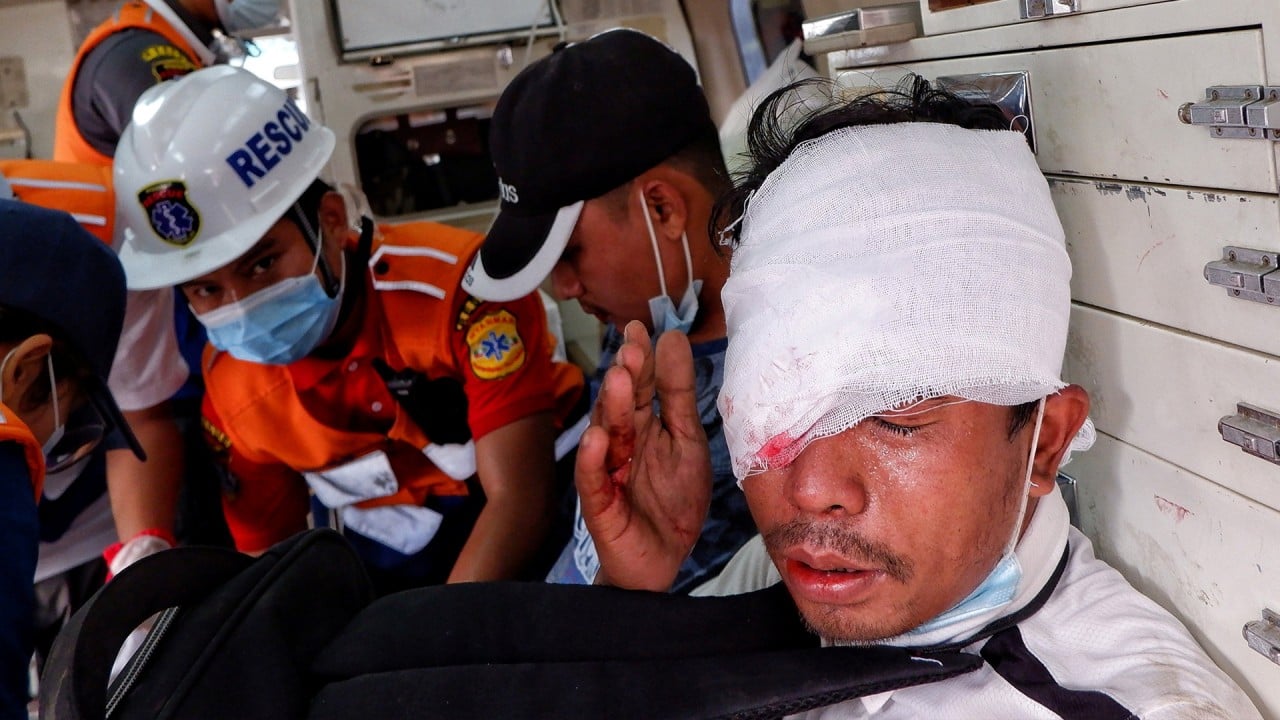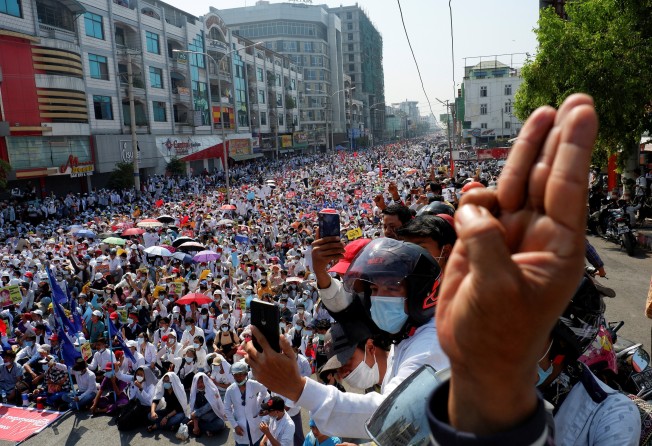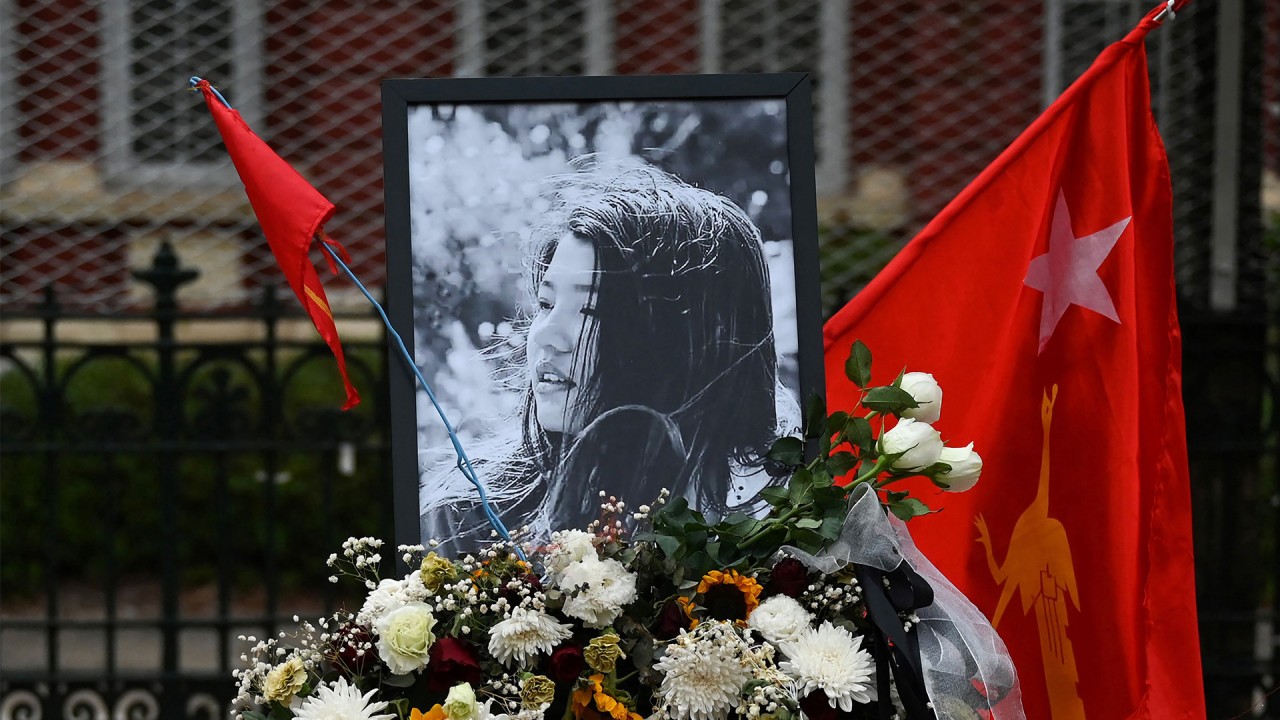
03:10
Myanmar anti-coup protesters plan their largest mass rally yet after deadly clash with military

Authorities in Myanmar used water cannons and chased after anti-coup protesters on Monday, as tens of thousands swarmed the streets across the Southeast Asian country, despite warnings from the junta that its patience for compliance was wearing.
Late on Sunday, state-run broadcaster MRTV broadcast a statement in Burmese, with English subtitles on the screen, saying that “protesters are now inciting the people, especially emotional teenagers and youths, to a confrontation path where they will suffer the loss of life”.
Three protesters have been killed in clashes with police, while one policeman has died. Authorities have detained 640 people since the coup, according to the monitoring group Assistance Association for Political Prisoners. Those targeted include railway workers, civil servants and bank staff who have walked off their jobs as part of the anti-coup campaign.
Three weeks after Myanmar’s experiment with democracy ended and the military regime took power, nations around the world are no closer to arriving at a consensus on how to get the generals to back down. The US imposed new sanctions on the regime, with Germany and the European Union threatening to follow suit, but in Asia, experts say this will not make a difference.
And with the regime making clear that it will not shy away from lethal force, they agree the limits of diplomacy are becoming increasingly clear and instead, the focus now should be on preventing an escalation of violence.
Retired Singapore ambassador-at-large Bilahari Kausikan said there was not much that the regional and community could do beyond expressions of concern and “diplomatic scurrying about to give the appearance of action.”
“Nobody regionally or internationally has much leverage and that includes Asean and China,” said Kausikan, a former permanent secretary from the Ministry of Foreign Affairs. “To me, the urgent priority is to prevent further bloodshed. That requires restraint on both sides.”

03:10
Myanmar anti-coup protesters plan their largest mass rally yet after deadly clash with military
Former Cambodian minister Pou Sothirak, who remains an adviser to Phnom Penh, added: “Asean needs to act swiftly through the use of its discrete diplomatic acumen to prevent the deterioration further of the social unrest and use of excessive force so as to avoid bloodshed and isolation of Myanmar.”
Reuters on Monday, citing three sources, reported that Indonesia was pushing its Asean neighbours to agree to an action plan that would keep the junta to its promise of holding elections, with monitors to ensure they are fair and inclusive. The plan also includes Asean facilitating dialogue between the junta and protesters, who demand that the military reverse the course of events and return power to the elected government of Aung San Suu Kyi, who is currently in detention, on charges of illegally owning imported walkie-talkies.
Indonesian foreign ministry spokesman Teuku Faizasyah said he was not aware of the proposal and said: “We should wait until Foreign Minister Retno Marsudi meets with Asean foreign ministers. The consultation takes time so I can‘t confirm when a statement will be released.”
Nicholas Coppel, Australia‘s former ambassador to Myanmar until 2018, said it was unlikely Asean was trying to diffuse the situation due to the regional grouping’s “cherished principle of non-interference in the internal affairs of member states”.
While there were a few functioning democracies within the 10-member bloc, there was no common view among them about what to do next, he said, though he added that a few individual Asean members – such as Indonesia, Singapore and the Philippines – might be engaged in outreach in their sovereign capacity.
“Indonesia is often viewed by the military generals as the model for Myanmar‘s transition from dictatorship to democracy.”
“However, no matter what they do, my assessment is that the military is impervious to foreign pressure,” Coppel said.
NO CONSENSUS
British Foreign Secretary Dominic Raab was due to speak at the UN Human Rights Council later on Monday, to reiterate calls for the military to “step aside” and for Suu Kyi to be freed. US Secretary of State Antony Blinken reiterated on Monday that Washington, which has imposed new sanctions on the military regime, would “continue to take firm action against those who perpetrate violence against the people of Burma”.
On Twitter, former Australian prime minister Kevin Rudd called for “decisive and urgent UN intervention” in order to prevent “massive bloodshed”. He said this should be supported by all governments.
But Sothirak urged the international community to “avoid a confrontational approach and [refrain] from the use of military intervention”.
“Instead, they should lend all their support to any initiative that supports the start up of internal dialogues between the civilian and military leaders in Myanmar as well as encourage and backup Asean in its attempt to exercise its ‘conflict resolution’ mechanism effectively,” said Sothirak, who was previously secretary of state at the Cambodian Foreign Affairs Ministry. “The international community should refrain from imposing hard sanctions on Myanmar, but encourage the internal belligerent parties to resort to dialogue and compromise with mutual respect.”

03:02
Myanmar protester shot in head during police crackdown dies
Maung Zarni, co-founder and head of Forsea, a grass roots network of pro-democracy scholars and human rights activists across Southeast Asia, said the US and the EU ought to have a high-level meeting to discuss how to create a safe exit for the coup leaders to climb down, and undertake a strategic road map for reversing the coup.
These include the release of all detained politicians and citizen leaders, over 1,000 by now, restoring the democratic process with the National League for Democracy as the interim government, and “not as the dominant one-party regime with Suu Kyi as her own known autocracy”.
Zarni added that China’s involvement can be overlooked as it has “zero interest in democratisation or human rights at home or across Asia, as long as stability in Myanmar can be restored fully.”
Kausikan said that only the military generals could change the minds of their counterparts, adding that it was only when the military felt secure enough and decided to move, that things changed the last time, referring to how Myanmar was ruled by the military for about five decades after a 1962 coup. It began its democratic transition about a decade ago, and while Suu Kyi came to power after her party won the 2015 election, the generals retained substantial power under a military-drafted constitution.
“[The military] have obviously now decided that was a mistake or premature to have moved,” Kausikan said, adding that “this time, I doubt they will budge until they have rendered Aung San Suu Kyi totally politically irrelevant.”
Kausikan said that was precisely why the military has pressed charges against her, so that the head of the civilian government can be put in jail “so she cannot contest the next elections whenever they may be”.
“But that’s quite a challenge. Even in jail Aung San Suu Kyi will still be a political force, perhaps even more so. We are in for a prolonged impasse,” Kausikan said.
Coppel said it was still important for the international and regional community to show their support for democracy and democratic institutions, and to show their solidarity with those seeking a return to democracy in Myanmar.
But Kausikan said those who were outside Myanmar and encouraging street protests should bear in mind that they “bear no risk if and when the shooting starts in earnest as I fear it might if the protests escalate.”
Zarni said the images showing Burmese people on the streets peacefully protesting and defying the threats by the military showed how far they were prepared to go. He accused the military of lying to the public about how two protesters were killed.
“[They] blatantly lied to the public that the two killed were trying to grab guns, while they were snipered from hundreds of yards away,” Zarni said, adding that the military had deployed notorious Light Infantry Divisions 33, 22, 77 and others “known for their crimes against humanity”.
Kausikan said the “only faint hope” lay in a compromise between Suu Kyi, who he said was not without her own share of responsibility for the situation, and the Myanmar military.
“But that does not look very likely for now. Both Aung San Suu Kyi and the generals view politics as a zero-sum game and neither is known for their ability to compromise,” he said.